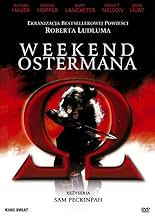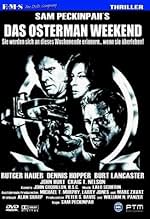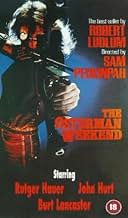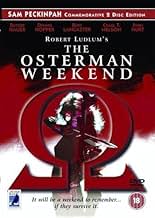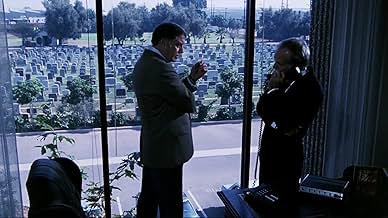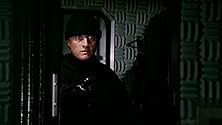IMDb-BEWERTUNG
5,8/10
9822
IHRE BEWERTUNG
Während des Kalten Krieges wird ein umstrittener Fernsehjournalist von der C.I.A. gebeten, bestimmte Bekannte, die sowjetische Agenten des Omega-Netzwerks sind, zum Überlaufen zu bewegen.Während des Kalten Krieges wird ein umstrittener Fernsehjournalist von der C.I.A. gebeten, bestimmte Bekannte, die sowjetische Agenten des Omega-Netzwerks sind, zum Überlaufen zu bewegen.Während des Kalten Krieges wird ein umstrittener Fernsehjournalist von der C.I.A. gebeten, bestimmte Bekannte, die sowjetische Agenten des Omega-Netzwerks sind, zum Überlaufen zu bewegen.
- Regie
- Drehbuch
- Hauptbesetzung
- Auszeichnungen
- 2 wins total
Empfohlene Bewertungen
John Tanner is a controversial journalist who makes it his business to hold truth to power on his television show, exposing government corruption wherever and whenever he can. As he is preparing for a weekend get together with three of his closest friends at his lavish California estate, Tanner is contacted by a CIA agent named Laurence Fassett. It transpires that Fassett and the agency believe Tanner's friends are part of a Soviet spy network, and they think he can get them to defect. As the weekend rolls on, suspicions become raised on all sides, and- as the lines between truth, fiction, loyalty and betrayal are irrevocably blurred- the question arises: just who is manipulating whom?
Directed by Sam Peckinpah and based on Robert Ludlum's novel of the same name, 'The Osterman Weekend' is a well-acted thriller that rises above its source material, though seems a sad swansong for such a visionary director. Screenwriters Ian Masters and Alan Sharp have injected some much-needed energy and cohesion into Ludlum's convoluted tale, transforming it into a parable about the power of television as a tool of propaganda, instead of the weak meditation on revenge and cold-war paranoia that it originally was.
Unlike in the book, Masters and Sharp use 'The Osterman Weekend' to explore how the media shapes narratives, changes meanings and influences opinions through editing and censorship. Through Tanner's program and the machinations of the CIA, they examine the idea that belief is generated through television- in other words, if people see it on TV, they believe it. While not a particularly profound or original notion, it lends the narrative more weight, as well as providing additional dramatic tension throughout.
This is not to say that 'The Osterman Weekend' should be lauded as a masterpiece, only that it asks more interesting questions than Ludlum's novel, and has a clearer message at its center. Masters and Sharp have not made Ludlum's awkward dialogue any more eloquent, nor has the inclusion of a new character and a new ending helped matters any. The story is still inherently flawed, and bad post-production and editing without Peckinpah's involvement means the finished product is a tad schizophrenic in terms of tone and content- though it is still inarguably easier to follow and more assured than its source material.
'The Osterman Weekend' reunites Peckinpah with cinematographer John Coquillon, whose talents the director had utilized for 'Pat Garrett & Billy the Kid' and 'Straw Dogs'. Coquillon does fine work that fits well within Peckinpah's oeuvre, featuring much of the director's trademark slow-motion violence. By incorporating CCTV footage from multiple monitors, Coquillon shows us different perspectives on events throughout, bolstering Tanner's paranoia and uncertainty about the reality of his situation. Odd angles and lighting are used to heighten this paranoia, though the overall visual aesthetic is one far less stylized than Peckinpah's 'The Wild Bunch', or Coquillon's work on 'Witchfinder General,' adding a sense of authenticity to proceedings.
Also contributing to the sense of paranoia and authenticity are the cast, many of whom deliver nuanced performances that keep audiences unsure of their motivations and loyalties. Rutger Hauer is charismatic and commanding as Tanner, showing a side of his personality he had not yet done through his villainous roles in Hollywood films. Craig T. Nelson does sterling work as Osterman, making him charming, yet morally mysterious. Dennis Hopper fades into the background somewhat, though has some good scenes with Helen Shaver, who is consistently excellent as his drugged-out wife, displaying much emotional perspicuity.
In his case, the great Burt Lancaster seems bored as the director of the CIA, apparently disliking Peckinpah's interpretation of the character and direction. For their parts, Chris Sarandon, Meg Foster and Cassie Yates are competent but generally underused. The real stand-out is John Hurt, who is spellbinding as Fassett, all but stealing the picture. Convincing, conniving and complex, Hurt transforms the one-note caricature of Ludlum's book into the most interesting character in the film, and it's a joy any time he's on screen.
Sam Peckinpah's last film, 'The Osterman Weekend' is far from his best work. Though it is well acted and features fine cinematography, the story leaves a lot to be desired, and post-production work without the involvement of the director leaves the finished product lacking consistency and coherence. Though its indictment of television as a mode of propaganda is still timely, it is not a particularly subtle or profound work in that regard. To conclude, though it has its moments, Bloody Sam deserved a better last hurrah than this.
Directed by Sam Peckinpah and based on Robert Ludlum's novel of the same name, 'The Osterman Weekend' is a well-acted thriller that rises above its source material, though seems a sad swansong for such a visionary director. Screenwriters Ian Masters and Alan Sharp have injected some much-needed energy and cohesion into Ludlum's convoluted tale, transforming it into a parable about the power of television as a tool of propaganda, instead of the weak meditation on revenge and cold-war paranoia that it originally was.
Unlike in the book, Masters and Sharp use 'The Osterman Weekend' to explore how the media shapes narratives, changes meanings and influences opinions through editing and censorship. Through Tanner's program and the machinations of the CIA, they examine the idea that belief is generated through television- in other words, if people see it on TV, they believe it. While not a particularly profound or original notion, it lends the narrative more weight, as well as providing additional dramatic tension throughout.
This is not to say that 'The Osterman Weekend' should be lauded as a masterpiece, only that it asks more interesting questions than Ludlum's novel, and has a clearer message at its center. Masters and Sharp have not made Ludlum's awkward dialogue any more eloquent, nor has the inclusion of a new character and a new ending helped matters any. The story is still inherently flawed, and bad post-production and editing without Peckinpah's involvement means the finished product is a tad schizophrenic in terms of tone and content- though it is still inarguably easier to follow and more assured than its source material.
'The Osterman Weekend' reunites Peckinpah with cinematographer John Coquillon, whose talents the director had utilized for 'Pat Garrett & Billy the Kid' and 'Straw Dogs'. Coquillon does fine work that fits well within Peckinpah's oeuvre, featuring much of the director's trademark slow-motion violence. By incorporating CCTV footage from multiple monitors, Coquillon shows us different perspectives on events throughout, bolstering Tanner's paranoia and uncertainty about the reality of his situation. Odd angles and lighting are used to heighten this paranoia, though the overall visual aesthetic is one far less stylized than Peckinpah's 'The Wild Bunch', or Coquillon's work on 'Witchfinder General,' adding a sense of authenticity to proceedings.
Also contributing to the sense of paranoia and authenticity are the cast, many of whom deliver nuanced performances that keep audiences unsure of their motivations and loyalties. Rutger Hauer is charismatic and commanding as Tanner, showing a side of his personality he had not yet done through his villainous roles in Hollywood films. Craig T. Nelson does sterling work as Osterman, making him charming, yet morally mysterious. Dennis Hopper fades into the background somewhat, though has some good scenes with Helen Shaver, who is consistently excellent as his drugged-out wife, displaying much emotional perspicuity.
In his case, the great Burt Lancaster seems bored as the director of the CIA, apparently disliking Peckinpah's interpretation of the character and direction. For their parts, Chris Sarandon, Meg Foster and Cassie Yates are competent but generally underused. The real stand-out is John Hurt, who is spellbinding as Fassett, all but stealing the picture. Convincing, conniving and complex, Hurt transforms the one-note caricature of Ludlum's book into the most interesting character in the film, and it's a joy any time he's on screen.
Sam Peckinpah's last film, 'The Osterman Weekend' is far from his best work. Though it is well acted and features fine cinematography, the story leaves a lot to be desired, and post-production work without the involvement of the director leaves the finished product lacking consistency and coherence. Though its indictment of television as a mode of propaganda is still timely, it is not a particularly subtle or profound work in that regard. To conclude, though it has its moments, Bloody Sam deserved a better last hurrah than this.
It's Sam Peckinpah's last film, and as a fan of this brilliant, troubled man, I wanted it to be a good one to go out on. What I got instead is another of his problem pictures, an interesting premise and eye-raising performances done in by a loss of focus.
John Tanner (Rutger Hauer) is a TV interviewer given an unpleasant assignment by CIA operative Lawrence Fassett (John Hurt): Confront a group of college friends with evidence they are working for a KGB operative named Mikalovich. An array of videotapes provided by Fassett demonstrates their culpability to Tanner. So he sets to work, his home the setting for a prearranged weekend gathering. If it works, a live interview with CIA Director Maxwell Danforth (Burt Lancaster) will be his reward.
For Peckinpah, it was his first film in more than half-a-decade, and a chance to show he was still able to deliver a solid action film well after his gritty early-'70s peak. The CIA comes equipped with cool surveillance equipment and laser-sighted automatics. The Weekend itself, once it gets going, has a nice "Big Chill" vibe with paranoid undertones.
So what goes wrong?
It starts with a 40-minute intro that establishes the premise in clunky fashion. "I'm Cloak, you must be Dagger" Tanner says upon meeting Danforth, whom Lancaster plays with brio but not subtlety. "Being wrong is not nearly as important as not admitting it, not these days," he tells one Company weasel, and acts throughout as the kind of clod you wouldn't put in charge of a shoe store, let alone the CIA.
Then we get to the Weekend itself, with Tanner's college friends taking center stage. Each has their quirks. Osterman (Craig T. Nelson) is a very cool TV producer who describes himself as "a nihilistic anarchist who lives on residuals". Nelson is great fun, though the rest of the group, including Dennis Hopper, gets lost in the mix. Only Helen Shaver's turn as a coked-out floozy stands out, as much for her gratuitous nude scenes as for her entertaining freak outs.
Sappy lite-jazz music by Lalo Schifrin underscores a lack of suspense. Hauer's Dutch accent keeps creeping in like Nastassja Kinski's, and his fragile relationship with his bow-toting wife (Meg Foster) isn't developed any more than those with his once-merry, now-sullen Berkeley chums.
The actual jigsaw puzzle we get here is indifferently assembled and seems at end a few pieces short. At one point Tanner hears Osterman on tape tell his friends "Let's go to our friend John Tanner's house and set him up". Tanner doesn't take this kindly, reasonably enough, yet what Osterman may have meant is never explained. A lot of threads are pulled out this way only to be left floating in the breeze.
John Coquillon's cinematography does capture something the rest of the film flails at, a sense of mystery and foreboding. Hurt's tortured performance as Fassett is nicely underplayed, watching beady-eyed between sips of wine from a china cup as the gears shift into play. And Nelson does crack me up, as in one scene which finds him running for cover.
"It'd be nice if we had weapons!"
"We do!" he is told. "Bows!"
"Bows?" Osterman replies. "That's keen!"
In the end, we get a wrap-up lecture about the pervading influence of television and how this all was, as one character puts it, "just another episode in this snuff soap opera we're all in." Peckinpah supposedly hated this script, only using it because he needed the film, but I think those sad words represent his actual mindset all-too-well. Distrait, somewhat lethargic, and depressing, "The Osterman Weekend" gives us lots of clues but no answers as to where Sam fell off.
John Tanner (Rutger Hauer) is a TV interviewer given an unpleasant assignment by CIA operative Lawrence Fassett (John Hurt): Confront a group of college friends with evidence they are working for a KGB operative named Mikalovich. An array of videotapes provided by Fassett demonstrates their culpability to Tanner. So he sets to work, his home the setting for a prearranged weekend gathering. If it works, a live interview with CIA Director Maxwell Danforth (Burt Lancaster) will be his reward.
For Peckinpah, it was his first film in more than half-a-decade, and a chance to show he was still able to deliver a solid action film well after his gritty early-'70s peak. The CIA comes equipped with cool surveillance equipment and laser-sighted automatics. The Weekend itself, once it gets going, has a nice "Big Chill" vibe with paranoid undertones.
So what goes wrong?
It starts with a 40-minute intro that establishes the premise in clunky fashion. "I'm Cloak, you must be Dagger" Tanner says upon meeting Danforth, whom Lancaster plays with brio but not subtlety. "Being wrong is not nearly as important as not admitting it, not these days," he tells one Company weasel, and acts throughout as the kind of clod you wouldn't put in charge of a shoe store, let alone the CIA.
Then we get to the Weekend itself, with Tanner's college friends taking center stage. Each has their quirks. Osterman (Craig T. Nelson) is a very cool TV producer who describes himself as "a nihilistic anarchist who lives on residuals". Nelson is great fun, though the rest of the group, including Dennis Hopper, gets lost in the mix. Only Helen Shaver's turn as a coked-out floozy stands out, as much for her gratuitous nude scenes as for her entertaining freak outs.
Sappy lite-jazz music by Lalo Schifrin underscores a lack of suspense. Hauer's Dutch accent keeps creeping in like Nastassja Kinski's, and his fragile relationship with his bow-toting wife (Meg Foster) isn't developed any more than those with his once-merry, now-sullen Berkeley chums.
The actual jigsaw puzzle we get here is indifferently assembled and seems at end a few pieces short. At one point Tanner hears Osterman on tape tell his friends "Let's go to our friend John Tanner's house and set him up". Tanner doesn't take this kindly, reasonably enough, yet what Osterman may have meant is never explained. A lot of threads are pulled out this way only to be left floating in the breeze.
John Coquillon's cinematography does capture something the rest of the film flails at, a sense of mystery and foreboding. Hurt's tortured performance as Fassett is nicely underplayed, watching beady-eyed between sips of wine from a china cup as the gears shift into play. And Nelson does crack me up, as in one scene which finds him running for cover.
"It'd be nice if we had weapons!"
"We do!" he is told. "Bows!"
"Bows?" Osterman replies. "That's keen!"
In the end, we get a wrap-up lecture about the pervading influence of television and how this all was, as one character puts it, "just another episode in this snuff soap opera we're all in." Peckinpah supposedly hated this script, only using it because he needed the film, but I think those sad words represent his actual mindset all-too-well. Distrait, somewhat lethargic, and depressing, "The Osterman Weekend" gives us lots of clues but no answers as to where Sam fell off.
Action movie in Peckinpah style with tension , intrigue , thrills , gushing blood and violence . The one weekend of the year you won't want to miss. The host of an investigative news spectacle (Rutger Hauer,first major character in a Hollywood movie played by Dutch actor) is assigned a dangerous mission As TV show hosted by television journalist John Tanner is called "Face to Face" and he is convinced by a CIA operative (John Hurt was second billed) that the friends (Chris Sarandon , Dennis Hooper , Craig T Nelson) and wives (Helen Shaver ,Cassie Yates) he has invited to a weekend party are Russian spies from a secret organization . The name of the Soviet spy network was "Omega".
This actioner and suspenseful movie tells a convoluted and complicated tale of vendetta , espionage and treason . Interesting but slightly boring spy film , including an overly complex and confusing script , even though at times it is admittedly engrossing . The picture was made and released about eleven years after its source novel of the same name by Robert Ludlum had been first published in 1972 . Sam Peckinpah was fired as director during post-production. Others were Convoy and Ride the High County . When he refused to re-edit Osterman weekend after it was screened for a test audience and met with a confused and extremely mixed reaction. Producers took over the editing with the assistance of the editor , drastically altering opening and ending sequences. Mediocre and dark cinematography by John Coquillon , in fact , the picture involved a considerable amount of filming at night. It was filmed at a 1950s ranch located in upper Mandeville Canyon in the Hollywood Hills , it was a property once owned by Robert Taylor and has been frequently been known by the names the "Taylor Estate" . Anti-climatic soundtrack by Lalo Schifrin composed by means by synthesizer . Director Don Siegel, long time friend and mentor to Sam Peckinpah, recommended Lalo Schifrin as the film's composer. Schifrin had scored five of Siegel's movies ; composer Lalo Schifrin had to sit by Sam Peckinpah's sick bed in order to spot the film and decide which scenes did or did not need music.
Final film of director Sam Peckinpah. The picture was also Peckinpah's big "comeback movie", it was his first in five years, his last film having been at the time Convoy back in 1978 . The movie is also Peckinpah's only feature film of the 1980s decade . The production shoot for this film ran for fifty-four days . Director Sam Peckinpah was in ill-health throughout the shoot as the long-term toll of his drug and alcohol abuse suggested to many in the production that he was dying. Peckinpah after beginning as a writer , was soon involved in TV Westerns at the peak of his popularity ; shooting series just like ¨¨The Westener¨, ¨Gunsmoke¨and most popular ¨Rifleman¨, moving into films by 1961 when he made nice impression with ¨The deadly companions¨, ¨Ride the High Country¨ , Major Dundee¨ and his best picture ,Wild Bunch¨ . After that , he concentrated on nail-biting and tougher-than-tough action films just like ¨The getaway¨, ¨Convoy¨, ¨the ¨killer elite¨ and this last movie ¨Osterman weekend¨ . The final title as violent and nice as anyone the Western or wartime genre has given us .
This actioner and suspenseful movie tells a convoluted and complicated tale of vendetta , espionage and treason . Interesting but slightly boring spy film , including an overly complex and confusing script , even though at times it is admittedly engrossing . The picture was made and released about eleven years after its source novel of the same name by Robert Ludlum had been first published in 1972 . Sam Peckinpah was fired as director during post-production. Others were Convoy and Ride the High County . When he refused to re-edit Osterman weekend after it was screened for a test audience and met with a confused and extremely mixed reaction. Producers took over the editing with the assistance of the editor , drastically altering opening and ending sequences. Mediocre and dark cinematography by John Coquillon , in fact , the picture involved a considerable amount of filming at night. It was filmed at a 1950s ranch located in upper Mandeville Canyon in the Hollywood Hills , it was a property once owned by Robert Taylor and has been frequently been known by the names the "Taylor Estate" . Anti-climatic soundtrack by Lalo Schifrin composed by means by synthesizer . Director Don Siegel, long time friend and mentor to Sam Peckinpah, recommended Lalo Schifrin as the film's composer. Schifrin had scored five of Siegel's movies ; composer Lalo Schifrin had to sit by Sam Peckinpah's sick bed in order to spot the film and decide which scenes did or did not need music.
Final film of director Sam Peckinpah. The picture was also Peckinpah's big "comeback movie", it was his first in five years, his last film having been at the time Convoy back in 1978 . The movie is also Peckinpah's only feature film of the 1980s decade . The production shoot for this film ran for fifty-four days . Director Sam Peckinpah was in ill-health throughout the shoot as the long-term toll of his drug and alcohol abuse suggested to many in the production that he was dying. Peckinpah after beginning as a writer , was soon involved in TV Westerns at the peak of his popularity ; shooting series just like ¨¨The Westener¨, ¨Gunsmoke¨and most popular ¨Rifleman¨, moving into films by 1961 when he made nice impression with ¨The deadly companions¨, ¨Ride the High Country¨ , Major Dundee¨ and his best picture ,Wild Bunch¨ . After that , he concentrated on nail-biting and tougher-than-tough action films just like ¨The getaway¨, ¨Convoy¨, ¨the ¨killer elite¨ and this last movie ¨Osterman weekend¨ . The final title as violent and nice as anyone the Western or wartime genre has given us .
For all the poor reviews this film originally got, it isn't that bad. Sam Peckinpah's final film deals with the cold war, double agents, mind games, and how we watch such things every day through our television screens. And its often the perception of the camera that gives us our own. Even during the more confusing parts, the film is difficult to turn away from. The cast is exceptional, there is quite a bit of action, and you will sometimes feel the need to back up and re-watch some scenes. There were certainly worse films being made back in those days...
The central character is a television host played by the typically outstanding Rutger Hauer. One day he is summoned to a meeting with the CIA who instruct him that three of his best friends are really KGB agents and he must help expose them! That would be quite a thing to hear. Hauer is at first approached by John Hurt (who steals this movie), and then by the CIA director played by Burt Lancaster. Once Hauer agrees to expose his friends over the course of a weekend at his place, they inform him he never had a choice but to do so, anyway! Nice bunch of guys at the CIA. Hurt clearly has his own agenda, and it is one of revenge since Lancaster apparently once ordered Hurt's wife killed to protect their operations in Europe. And Hurt does not hesitate putting Hauer and his friends in jeopardy to achieve his goals. Are the friends KGB? I don't think we ever learn for sure if any are, but they do have left-leaning attitudes as well as things to hide. Honestly, by the end of this film it hardly even matters. The film concludes with both Hurt and Lancaster being exposed as crooked on Hauer's TV show, and Hauer attempting to rescue his wife and child from Hurt. Yes the plot is messy, but its based on a novel. Often times there are important things that need to be left out of a novel in order to have time to make it into a movie. That could be one explanation for the impenetrable plot details.
Peckinpah may have been near death, but this is still his film. You can tell with all the pretty women, slow motion action and gun play. Peckinpah claims the studio wanted him to re-cut it after a poor test audience reaction. But by this late stage in his life, it is unclear that he had the facilities to make this one a true winner. Give this film a try if you stumble across it. Or maybe just read the book. 6 0f 10 stars.
The Hound.
The central character is a television host played by the typically outstanding Rutger Hauer. One day he is summoned to a meeting with the CIA who instruct him that three of his best friends are really KGB agents and he must help expose them! That would be quite a thing to hear. Hauer is at first approached by John Hurt (who steals this movie), and then by the CIA director played by Burt Lancaster. Once Hauer agrees to expose his friends over the course of a weekend at his place, they inform him he never had a choice but to do so, anyway! Nice bunch of guys at the CIA. Hurt clearly has his own agenda, and it is one of revenge since Lancaster apparently once ordered Hurt's wife killed to protect their operations in Europe. And Hurt does not hesitate putting Hauer and his friends in jeopardy to achieve his goals. Are the friends KGB? I don't think we ever learn for sure if any are, but they do have left-leaning attitudes as well as things to hide. Honestly, by the end of this film it hardly even matters. The film concludes with both Hurt and Lancaster being exposed as crooked on Hauer's TV show, and Hauer attempting to rescue his wife and child from Hurt. Yes the plot is messy, but its based on a novel. Often times there are important things that need to be left out of a novel in order to have time to make it into a movie. That could be one explanation for the impenetrable plot details.
Peckinpah may have been near death, but this is still his film. You can tell with all the pretty women, slow motion action and gun play. Peckinpah claims the studio wanted him to re-cut it after a poor test audience reaction. But by this late stage in his life, it is unclear that he had the facilities to make this one a true winner. Give this film a try if you stumble across it. Or maybe just read the book. 6 0f 10 stars.
The Hound.
After the utterly ridiculous good-ol'-boy trucker film CONVOY in 1978, Sam Peckinpah languished for five years before returning in 1983 with what would prove to be his final film--THE OSTERMAN WEEKEND, based on Robert Ludlum's maddeningly complex 1972 spy novel.
Despite the fact that it is often cold and sometimes confusing, this film's weakest moments are far superior to even the strongest moments of CONVOY. Rutger Hauer stars as a hard-hitting TV talk show host with a habit of skewering people inside the U.S. government. As this film opens, he is about to have a reunion with five friends of his from the good old days of 1960s radical college politics.
But then a CIA operative (John Hurt) drops a bombshell on him: Those friends of his (Craig T. Nelson, Dennis Hopper, Helen Shaver, Cassie Yates, Chris Sarandon) are supposedly traitors working for the Soviets in a scheme involving germ warfare sabotage. The result is that Hurt, with Hauer's reluctant acceptance, sets up surveillance equipment throughout Hauer's property to document further evidence of his friends' betrayal. When those people start coming unglued, however, more is at stake than just national security or the Cold War. So are peoples' lives!
Though Peckinpah was clearly on his last run while making it, THE OSTERMAN WEEKEND shows that he still could deliver the goods when it came to setting up great action sequences. The final shootout between Hurt's CIA underlings and Hauer and Nelson is edited in such a way as to resemble THE WILD BUNCH, while its actual filming suggests still another Peckinpah masterpiece, STRAW DOGS. Lalo Schifrin's score brilliantly accentuates things. Peckinpah, in depicting the head of the CIA (Burt Lancaster) as the heavy, also clearly makes a statement against America's heavy-handed approach toward Communism in the Reagan era.
All in all, despite its slight confusion, THE OSTERMAN WEEKEND works for those willing to give it a go.
Despite the fact that it is often cold and sometimes confusing, this film's weakest moments are far superior to even the strongest moments of CONVOY. Rutger Hauer stars as a hard-hitting TV talk show host with a habit of skewering people inside the U.S. government. As this film opens, he is about to have a reunion with five friends of his from the good old days of 1960s radical college politics.
But then a CIA operative (John Hurt) drops a bombshell on him: Those friends of his (Craig T. Nelson, Dennis Hopper, Helen Shaver, Cassie Yates, Chris Sarandon) are supposedly traitors working for the Soviets in a scheme involving germ warfare sabotage. The result is that Hurt, with Hauer's reluctant acceptance, sets up surveillance equipment throughout Hauer's property to document further evidence of his friends' betrayal. When those people start coming unglued, however, more is at stake than just national security or the Cold War. So are peoples' lives!
Though Peckinpah was clearly on his last run while making it, THE OSTERMAN WEEKEND shows that he still could deliver the goods when it came to setting up great action sequences. The final shootout between Hurt's CIA underlings and Hauer and Nelson is edited in such a way as to resemble THE WILD BUNCH, while its actual filming suggests still another Peckinpah masterpiece, STRAW DOGS. Lalo Schifrin's score brilliantly accentuates things. Peckinpah, in depicting the head of the CIA (Burt Lancaster) as the heavy, also clearly makes a statement against America's heavy-handed approach toward Communism in the Reagan era.
All in all, despite its slight confusion, THE OSTERMAN WEEKEND works for those willing to give it a go.
Wusstest du schon
- WissenswertesDirector Sam Peckinpah was in ill-health throughout the shoot. The long-term toll of his drug and alcohol abuse suggested to many in the production that he was dying. Peckinpah would go off and take opportune naps, but still completed and delivered his initial cut of this movie on time, despite sickness and exhaustion.
- PatzerThe surveillance cameras installed in the Tanner house each have a red light to indicate that they are working. Surely a camera for secret surveillance would not have a visible indicator for all to see.
- Zitate
Lawrence Fassett: Think of them as fleas on a dog hit by a car driven by a drunken teenager whose girlfriend just gave him the clap. It will help your sense of perspective.
- Alternative VersionenOn the Anchor Bay DVD release there is a rough cut made by Sam Peckinpah which he made showed to the test audience. Because the majority of the audience walked out, from the imfamous sex between Fassett and his wife. The producer wanted Peckinpah to cut the scene out. Once he refuse to made the cuts, he got fired. Other scenes. 1) The sex scene is more extended and shot more wobbly to express how Fassett breaking point for revenge had started. 2) Delete scene of Osterman and Joe talking on the phone about their deal. 3) Extended scene of Virginia flirting with Dick on the phone. 4) There a deleted scene of John Tanner of having an affair with his director Marcia, there wakes up to find her dead. 5) The scene where Tanner and guest are arguing by the dinner table, in the theatrical cut Fassett switches on a Swiss ad, the Peckinpah's cut he has like a big image of Danforth. 6) Alterative ending is juxtapositioned between Tanner searching for his family and the TV studio.
Top-Auswahl
Melde dich zum Bewerten an und greife auf die Watchlist für personalisierte Empfehlungen zu.
- How long is The Osterman Weekend?Powered by Alexa
Details
Box Office
- Budget
- 6.500.000 $ (geschätzt)
- Bruttoertrag in den USA und Kanada
- 6.486.797 $
- Eröffnungswochenende in den USA und in Kanada
- 301.129 $
- 23. Okt. 1983
- Weltweiter Bruttoertrag
- 6.486.797 $
Zu dieser Seite beitragen
Bearbeitung vorschlagen oder fehlenden Inhalt hinzufügen

Oberste Lücke
By what name was Das Osterman-Weekend (1983) officially released in India in English?
Antwort

